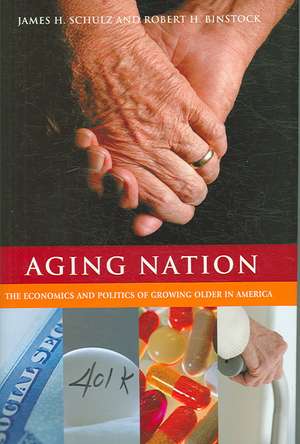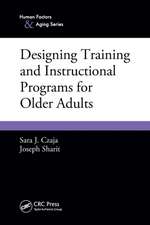Aging Nation: The Economics and Politics of Growing Older in America
Autor James H. Schulz, Robert H. Binstocken Limba Engleză Hardback – 29 oct 2006 – vârsta până la 17 ani
Preț: 323.73 lei
Preț vechi: 393.13 lei
-18% Nou
Puncte Express: 486
Preț estimativ în valută:
61.95€ • 64.81$ • 51.46£
61.95€ • 64.81$ • 51.46£
Carte tipărită la comandă
Livrare economică 02-16 aprilie
Preluare comenzi: 021 569.72.76
Specificații
ISBN-13: 9780275984151
ISBN-10: 027598415X
Pagini: 296
Dimensiuni: 156 x 235 x 27 mm
Greutate: 0.6 kg
Ediția:New.
Editura: Bloomsbury Publishing
Colecția Praeger
Locul publicării:New York, United States
ISBN-10: 027598415X
Pagini: 296
Dimensiuni: 156 x 235 x 27 mm
Greutate: 0.6 kg
Ediția:New.
Editura: Bloomsbury Publishing
Colecția Praeger
Locul publicării:New York, United States
Notă biografică
James H. Schulz is Emeritus Professor of Economics, Brandeis University. A former president of the Gerontological Society of America, and recipient of numerous awards-including the Kleemier Award for outstanding research in the field of aging-he has written extensively on aging, pensions, retirement, and social policy. His 17 books include Social Security in the Twenty-First Century, The Economics of Population Aging, Providing Adequate Retirement Income When Life-Time Employment Ends, and seven editions of The Economics of Aging.Robert H. Binstock is Professor of Aging, Health, and Society at Case Western Reserve University. A former president of the Gerontological Society of America, and recipient of numerous awards, he has served as director of a White House Task Force on Older Americans and as chairman and member of many advisory panels to the U.S., state, and local governments. He is the author of more than 250 articles and book chapters, primarily on the politics and policies affecting aging, and has published 24 books, including America's Political System, Too Old for Health Care?, The Future of Long-Term Care, and six editions of the Handbook of Aging and the Social Sciences.
Cuprins
Preface1. Baby Boomers and the Merchants of Doom2. The Phony Threat of Population Aging3. The Search for Security with Dignity4. Dealing with Risk5. The Company Pension: Altruism or Self-Interest?6. The Pension Lottery: Personal Pension Accounts7. To Work or Not to Work: That Is the Question8. Health and Longevity: What Lies Ahead?9. A Gerontocracy? The Politics of Aging10. Framing the Issues for an Aging NationNotesIndex
Recenzii
At the core of Aging Nation is a description and assessment of the strengths and weaknesses of major programs affecting the elderly (past and current) and rising generations. . . . Chapters 3 through 9 offer the clearest, most judicious assessment of the U.S. political economy in an aging society that I have read. For the quality of these analytic chapters alone, Aging Nation merits wide classroom adoption in gerontology, policy, and social science classes at the undergraduate and graduate levels.
[E]xtremely valuable and timely contributions to the struggle against the conservative attack on the nation's relatively modest efforts to ensure a minimum level of collective well-being. These books are analytically rigorous and lucid counterattacks against what Hacker calls the crusaders for personal responsibility and Schulz and Binstock call the merchants of doom.' (Reviewed in conjunction with The Great Risk Shift, Jacob S. Hacker, Oxford University Press.)
Writing for the general public, Schulz and Binstock describe changes occurring in the US due to the aging of baby boomers and how their retirement decisions will be affected. They also discuss situations they will need to consider and address areas usually covered in separate books: Social Security history, policy issues, reform proposals, health care issues, work and retirement policy, private pensions, and the politics of aging. In particular, they aim to aid readers in figuring out the truth behind pessimistic warnings of future problems in health care and policy for the elderly and describe how these focus on the wrong issues. Instead, they focus on system-wide health-care cost issues, retirement and personal pensions, problems with raising the retirement age, and the myth that the country will be ruled by the aged.
An insightful book about growing old in America by two of the country's leading policy gerontologists is must reading, especially because 76 million baby boomers are approaching retirement. Perhaps more to the point, can a balance be struck between the deserving poor and what is perceived to be greedy geezers?. . . This is a remarkable book that merits our immediate and full attention. The authors point out that instead of giving in to negative Nellies, the time has come for expert analysis, balanced viewpoints and a united effort so that we can secure our futures. Dispelling popular myths and misconceptions, Aging Nation maps out a comprehensive, sensible plan that deserves our consideration.
. . . this book provides a well-reasoned and readable antidote to the more hyperbolic and even hysterical claims of the 'doomsayers' documented by the authors. But more more than that, this is a thorough, insightful, and readable analysis of the key elements of financial security in retirement--Social Security, private pensions, employment, and health and long-term care.
[E]xtremely valuable and timely contributions to the struggle against the conservative attack on the nation's relatively modest efforts to ensure a minimum level of collective well-being. These books are analytically rigorous and lucid counterattacks against what Hacker calls the crusaders for personal responsibility and Schulz and Binstock call the merchants of doom.' (Reviewed in conjunction with The Great Risk Shift, Jacob S. Hacker, Oxford University Press.)
Writing for the general public, Schulz and Binstock describe changes occurring in the US due to the aging of baby boomers and how their retirement decisions will be affected. They also discuss situations they will need to consider and address areas usually covered in separate books: Social Security history, policy issues, reform proposals, health care issues, work and retirement policy, private pensions, and the politics of aging. In particular, they aim to aid readers in figuring out the truth behind pessimistic warnings of future problems in health care and policy for the elderly and describe how these focus on the wrong issues. Instead, they focus on system-wide health-care cost issues, retirement and personal pensions, problems with raising the retirement age, and the myth that the country will be ruled by the aged.
An insightful book about growing old in America by two of the country's leading policy gerontologists is must reading, especially because 76 million baby boomers are approaching retirement. Perhaps more to the point, can a balance be struck between the deserving poor and what is perceived to be greedy geezers?. . . This is a remarkable book that merits our immediate and full attention. The authors point out that instead of giving in to negative Nellies, the time has come for expert analysis, balanced viewpoints and a united effort so that we can secure our futures. Dispelling popular myths and misconceptions, Aging Nation maps out a comprehensive, sensible plan that deserves our consideration.
. . . this book provides a well-reasoned and readable antidote to the more hyperbolic and even hysterical claims of the 'doomsayers' documented by the authors. But more more than that, this is a thorough, insightful, and readable analysis of the key elements of financial security in retirement--Social Security, private pensions, employment, and health and long-term care.













